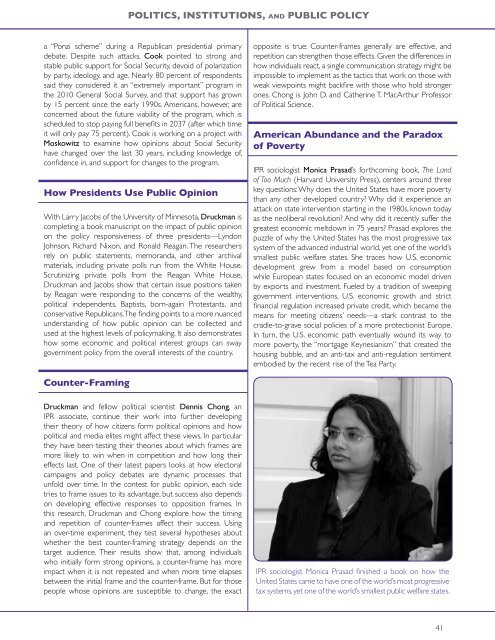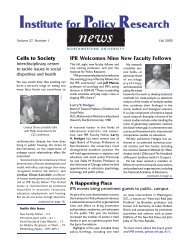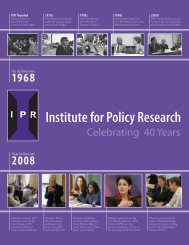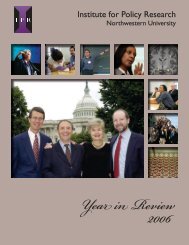Highlights of 2011 - Institute for Policy Research - Northwestern ...
Highlights of 2011 - Institute for Policy Research - Northwestern ...
Highlights of 2011 - Institute for Policy Research - Northwestern ...
You also want an ePaper? Increase the reach of your titles
YUMPU automatically turns print PDFs into web optimized ePapers that Google loves.
Politics, Institutions, AND Public <strong>Policy</strong><br />
a “Ponzi scheme” during a Republican presidential primary<br />
debate. Despite such attacks, Cook pointed to strong and<br />
stable public support <strong>for</strong> Social Security, devoid <strong>of</strong> polarization<br />
by party, ideology, and age. Nearly 80 percent <strong>of</strong> respondents<br />
said they considered it an “extremely important” program in<br />
the 2010 General Social Survey, and that support has grown<br />
by 15 percent since the early 1990s. Americans, however, are<br />
concerned about the future viability <strong>of</strong> the program, which is<br />
scheduled to stop paying full benefits in 2037 (after which time<br />
it will only pay 75 percent). Cook is working on a project with<br />
Moskowitz to examine how opinions about Social Security<br />
have changed over the last 30 years, including knowledge <strong>of</strong>,<br />
confidence in, and support <strong>for</strong> changes to the program.<br />
How Presidents Use Public Opinion<br />
With Larry Jacobs <strong>of</strong> the University <strong>of</strong> Minnesota, Druckman is<br />
completing a book manuscript on the impact <strong>of</strong> public opinion<br />
on the policy responsiveness <strong>of</strong> three presidents—Lyndon<br />
Johnson, Richard Nixon, and Ronald Reagan. The researchers<br />
rely on public statements, memoranda, and other archival<br />
materials, including private polls run from the White House.<br />
Scrutinizing private polls from the Reagan White House,<br />
Druckman and Jacobs show that certain issue positions taken<br />
by Reagan were responding to the concerns <strong>of</strong> the wealthy,<br />
political independents, Baptists, born-again Protestants, and<br />
conservative Republicans. The finding points to a more nuanced<br />
understanding <strong>of</strong> how public opinion can be collected and<br />
used at the highest levels <strong>of</strong> policymaking. It also demonstrates<br />
how some economic and political interest groups can sway<br />
government policy from the overall interests <strong>of</strong> the country.<br />
opposite is true: Counter-frames generally are effective, and<br />
repetition can strengthen those effects. Given the differences in<br />
how individuals react, a single communication strategy might be<br />
impossible to implement as the tactics that work on those with<br />
weak viewpoints might backfire with those who hold stronger<br />
ones. Chong is John D. and Catherine T. MacArthur Pr<strong>of</strong>essor<br />
<strong>of</strong> Political Science.<br />
American Abundance and the Paradox<br />
<strong>of</strong> Poverty<br />
IPR sociologist Monica Prasad’s <strong>for</strong>thcoming book, The Land<br />
<strong>of</strong> Too Much (Harvard University Press), centers around three<br />
key questions: Why does the United States have more poverty<br />
than any other developed country? Why did it experience an<br />
attack on state intervention starting in the 1980s, known today<br />
as the neoliberal revolution? And why did it recently suffer the<br />
greatest economic meltdown in 75 years? Prasad explores the<br />
puzzle <strong>of</strong> why the United States has the most progressive tax<br />
system <strong>of</strong> the advanced industrial world, yet one <strong>of</strong> the world’s<br />
smallest public welfare states. She traces how U.S. economic<br />
development grew from a model based on consumption<br />
while European states focused on an economic model driven<br />
by exports and investment. Fueled by a tradition <strong>of</strong> sweeping<br />
government interventions, U.S. economic growth and strict<br />
financial regulation increased private credit, which became the<br />
means <strong>for</strong> meeting citizens’ needs—a stark contrast to the<br />
cradle-to-grave social policies <strong>of</strong> a more protectionist Europe.<br />
In turn, the U.S. economic path eventually wound its way to<br />
more poverty, the “mortgage Keynesianism” that created the<br />
housing bubble, and an anti-tax and anti-regulation sentiment<br />
embodied by the recent rise <strong>of</strong> the Tea Party.<br />
Counter-Framing<br />
Druckman and fellow political scientist Dennis Chong, an<br />
IPR associate, continue their work into further developing<br />
their theory <strong>of</strong> how citizens <strong>for</strong>m political opinions and how<br />
political and media elites might affect these views. In particular<br />
they have been testing their theories about which frames are<br />
more likely to win when in competition and how long their<br />
effects last. One <strong>of</strong> their latest papers looks at how electoral<br />
campaigns and policy debates are dynamic processes that<br />
unfold over time. In the contest <strong>for</strong> public opinion, each side<br />
tries to frame issues to its advantage, but success also depends<br />
on developing effective responses to opposition frames. In<br />
this research, Druckman and Chong explore how the timing<br />
and repetition <strong>of</strong> counter-frames affect their success. Using<br />
an over-time experiment, they test several hypotheses about<br />
whether the best counter-framing strategy depends on the<br />
target audience. Their results show that, among individuals<br />
who initially <strong>for</strong>m strong opinions, a counter-frame has more<br />
impact when it is not repeated and when more time elapses<br />
between the initial frame and the counter-frame. But <strong>for</strong> those<br />
people whose opinions are susceptible to change, the exact<br />
IPR sociologist Monica Prasad finished a book on how the<br />
United States came to have one <strong>of</strong> the world’s most progressive<br />
tax systems, yet one <strong>of</strong> the world’s smallest public welfare states.<br />
41

















